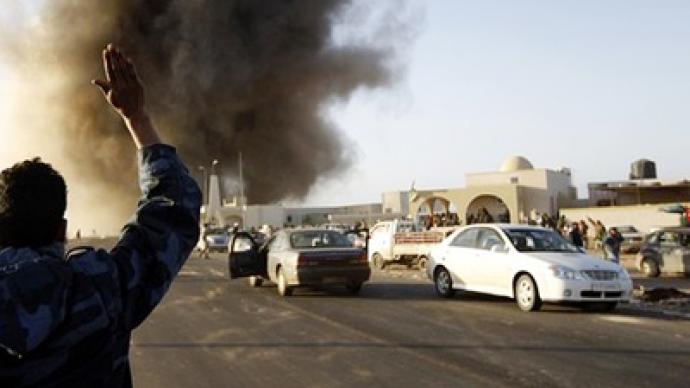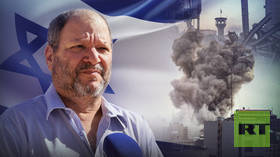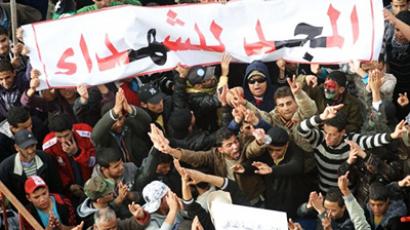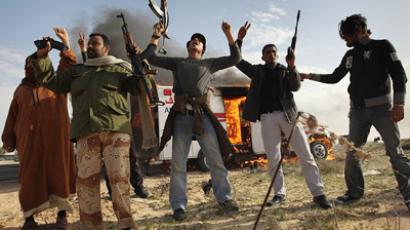Tripoli under fire in media information war

Inflamed violence continues to tear through Libya, more than three weeks after protests erupted. However, some believe that mainstream media outlets are way too one-sided in portraying the events in the country.
Benghazi-based rebel National Libyan Council confirmed on Tuesday that Muammar Gaddafi had talked to them, bargaining for an opportunity to escape the country, Reuters news agency reports. A source in the council told the agency on Monday that Muammar Gaddafi had offered to hand power to the head of parliament and leave Libya with a guaranteed sum of money. The council did not confirm the proposal on Monday, but on Tuesday announced that it had been, indeed, made. National Libyan Council’s spokesperson Mustafa Gheriani told the agency that the rebels rejected the deal. The Libyan government denied having talks with the council, Al Arabiya television reported. It also quoted Libya’s Foreign Minister as saying that the allegations of the National Libyan Council did not deserve a response.Muammar Gaddafi’s supporters are currently moving eastwards in order to reclaim towns which they lost during the popular uprising, Al Jazeera television has reported on Tuesday. According to the channel, pro-Gaddafi forces have retaken the town of Bin Jawad in central Libya and moved on to the oil port of Ras Lanuf. However all of these reports have been rejected by Gaddafi himself on state television Tuesday, although the opposition is still keeping its hopes up, coming forward with a new proposal: if Gaddafi were to step down now, they would not seek prosecution through the International Court of Justice.
Beware the power of recording devices
In the meantime, the US administration and Barack Obama have confirmed that the US is still considering military intervention in Libya. Amid all the controversy surrounding the possible military intervention, Robert Gates, the US Secretary of Defense, was caught joking about a possible attack on Libya with General David Petraeus upon his arrival to Afghanistan Monday.The unfortunate incident took place in the Kabul airport where General Petraeus greeted Gates, joking: “Welcome back, sir, flying a little bigger plane than normal … you gonna launch some attacks on Libya or something?”“Yeah, exactly,” responded Gates with a hearty laugh. Both were apparently unaware that their friendly chat was being recorded on a microphone.The international media is now guessing whether that remark was just a joke or whether there was some truth to it.Ivan Eland, a Senior Fellow and Director of the Center on Peace & Liberty at the Independent Institute in Washington DC, does not believe that Robert Gates and General Petraeus were, indeed, serious about the military action. However, he agrees, it was a bad joke.“I think this is similar to what Ronald Regan said during the Cold War when he said the bombing against the Soviet Union was starting in so many minutes or whatever…” he said. “But I think this is a bad saying because you don’t want to threaten, even in a joking manner or something like this, especially from the US Secretary of Defense. It was a bad comment.”“In fact, Gates was one of the people who’ve been saying, ‘Hey, let’s not do the no-fly zone, because this would entail attacking a country,’” Eland added.
The official position of the US is that in order to decide on a military intervention they need support from the international community.UN and NATO are still weighing in on the possibility of declaring a no-fly zone over Libya. However, a vote on a no-fly zone could be hard to secure at the UN Security Council where China, a permanent member, is very cool to this proposal and Russia has made it clear that any foreign military involvement would be unacceptable.Anti-war columnist and historian Nebojsa Malic from Washington DC says the situation with Libya resembles the build up to previous US interventions.“This is reminding me of Bosnia in the early 1990’s when a clear-cut case for the intervention could not be made and the public was not very much in the mood for war, so one had to be created gradually, by gradual involvement,” he said. “It started with humanitarian agents and observers, scouting missions, continued through to no-fly zone, and it ended up being a full-blown war several years later.”
Michael Hughes, a Seattle-based journalist for the Huffington Post, says the US should not intervene.“The Western agenda has always been anti-Gaddafi,” he told RT. “They feel better about having more control of the situation, because Gaddafi didn’t bow to US needs like other Middle East dictators.”The US media and the government, Hughes continued, have the perception that Gaddafi is a complete monster, and by portraying him this way they are looking for excuses for a possible intervention. However, such a scenario could drag the United States into another “Afghanistan,” the journalist explains.“If we intervene, theoretically we are going to be intervening on the side of the Islamists once again. There we go… Afghanistan again… We need to stay out of this,” Michael Hughes concluded.
Author Tim Gatto says the US could be using the humanitarian issue as an excuse to invade Libya.“What they are doing is they are saying that Gaddafi is killing all these people, you know, all those rebels and civilians on the ground, and they want to use a humanitarian excuse to invade Libya,” Gatto said.“Meanwhile, in Darfur there’ve been people dying left and right and you haven’t heard anybody say they want to send a military force to Darfur, because Darfur doesn’t have oil,” Tim Gatto continued. “I think that the United States and Britain and France are going to use this as an excuse to re-colonize Libya and take their oil."
Wag the dog
The death toll is rising in the country with several people killed in Monday battles, the source said. It is not completely clear now who is in control of which territories. Al Jazeera earlier reported bombings in the Libyan capital. However, people on the streets of Tripoli say that media coverage of events is far from objective. “I want to say to Al Jazeera: Wake up because you are in dreaming [land],” said a pro-Gaddafi supporter in Tripoli. “No one can kill Muammar Gaddafi, all Libya is with Muammar Gaddafi.”“They told us that Tripoli is bombed by [the] air force and heavy guns or something like that. It completely is not the truth,” said spokesman of Libyan Culture Ministry Abdul Lamushi. CNN reports suggest that Tripoli is facing gunfire, explosions and fighting with war planes firing at protesters. However, RT correspondent Paula Slier, who is currently in Tripoli, reports a completely different picture.According to Paula, the city looks more like it is going about its everyday business rather than being on the brink of war.“When we invited foreign media to come to Tripoli and to Libya, and to see and to watch and to send their reports to their channels, we noticed that the administration of their channels selected what they want from these reports and eliminate what does not serve their purposes,” Abdul Lamushi explains. Some people in Tripoli are angry with such state of affairs. Mohammed has taken a few days off from his work as an engineer to join the throngs of Gaddafi supporters in downtown Green Square.“They are hiding this, what is going on now,” he said. “All the people are here, just to be supportive for our leader Muammar Gaddafi and they want to hide this.” However, analysts say it is not just what is being hidden, it is also what is actually being said.“The language and the framing of the story and the type of headlines that are used and the things that are quoted – you would not see this kind of language or this kind of treatment in a story about Afghanistan, or a story about Iraq, where we are the aggressor,” said war journalist Keith Harmon Snow. “It makes it look like Gaddafi is the problem.”Paula Slier says the war is clearly not in Tripoli and, just as clearly, Western media has been a little too quick to write off Gaddafi. Both sides have their propaganda war and Tripoli is now under fire in this information battle.
Watch the latest update from Paula Slier
According to Asia Times correspondent Pepe Escobar, mainstream media hype is all about supporting the West’s urge to establish its control over the region. “They do not know what kind of opposition might emerge, if the Gaddafi regime disappears,” he said. “So in the minds of decision-makers in Washington and in Brussels [is] if we go there and we prop up the next government, we will be in charge of Northern Africa, we will be close to Egypt and close to Tunisia and Algeria, we will be in control in the region. That is the real game we will not see spelled out in mainstream media.”
Still, there is no opposition force in Libya strong enough to create its own political agenda, believes Barah Mikhail, a Middle East expert from Fride – a Madrid based think tank for global action.“Talking about strong opposition groups to Gaddafi’s regime is not an easy thing”, says Barah Mikhail. “It is hard to determine who could be the real charismatic leader or real strong structure on the ground who could say ‘Well, I am known by the Libyans, I have a program, I have some horizons and I will be able to be the alternative that will help achieving better horizons in Libya.”














